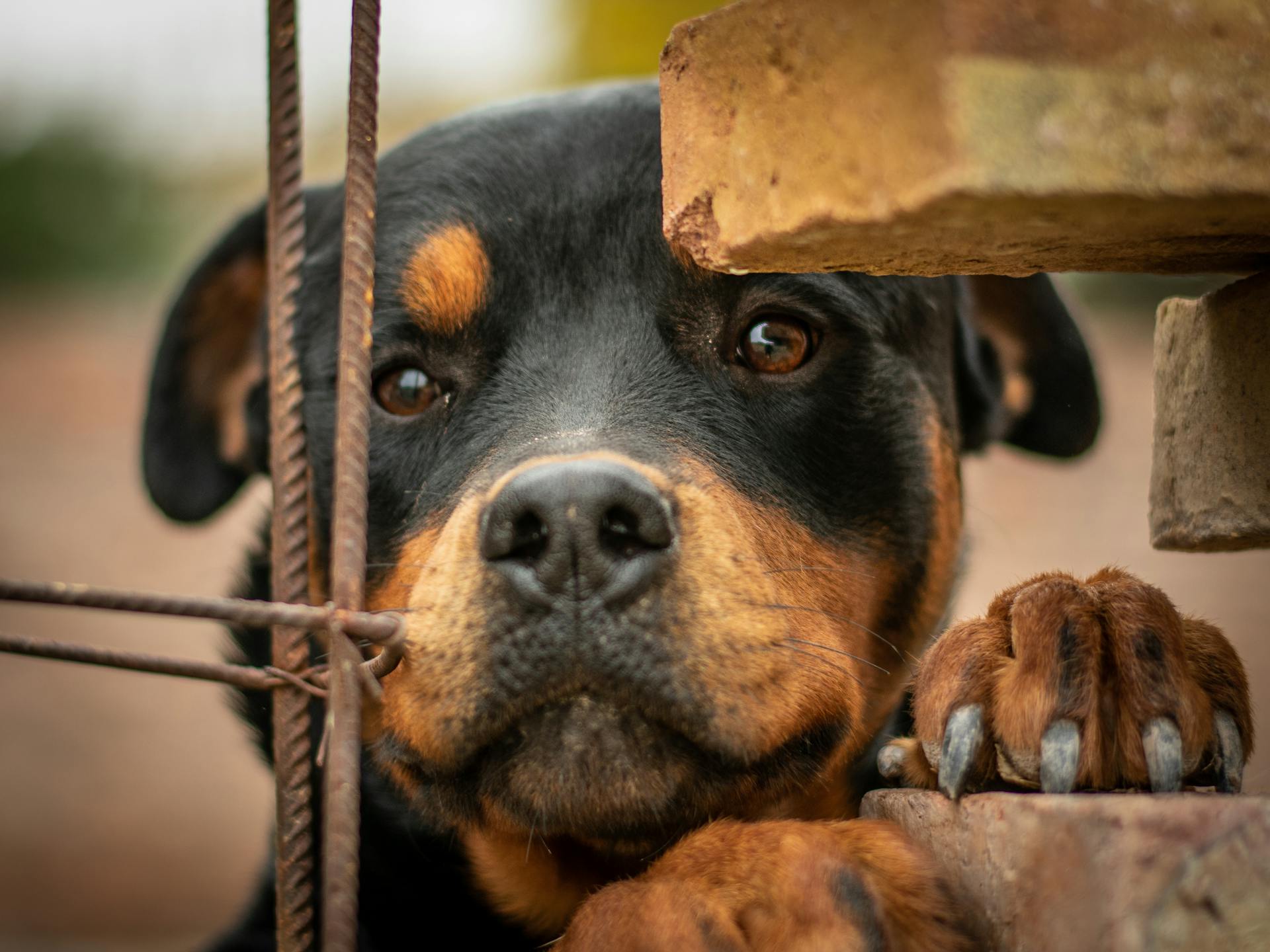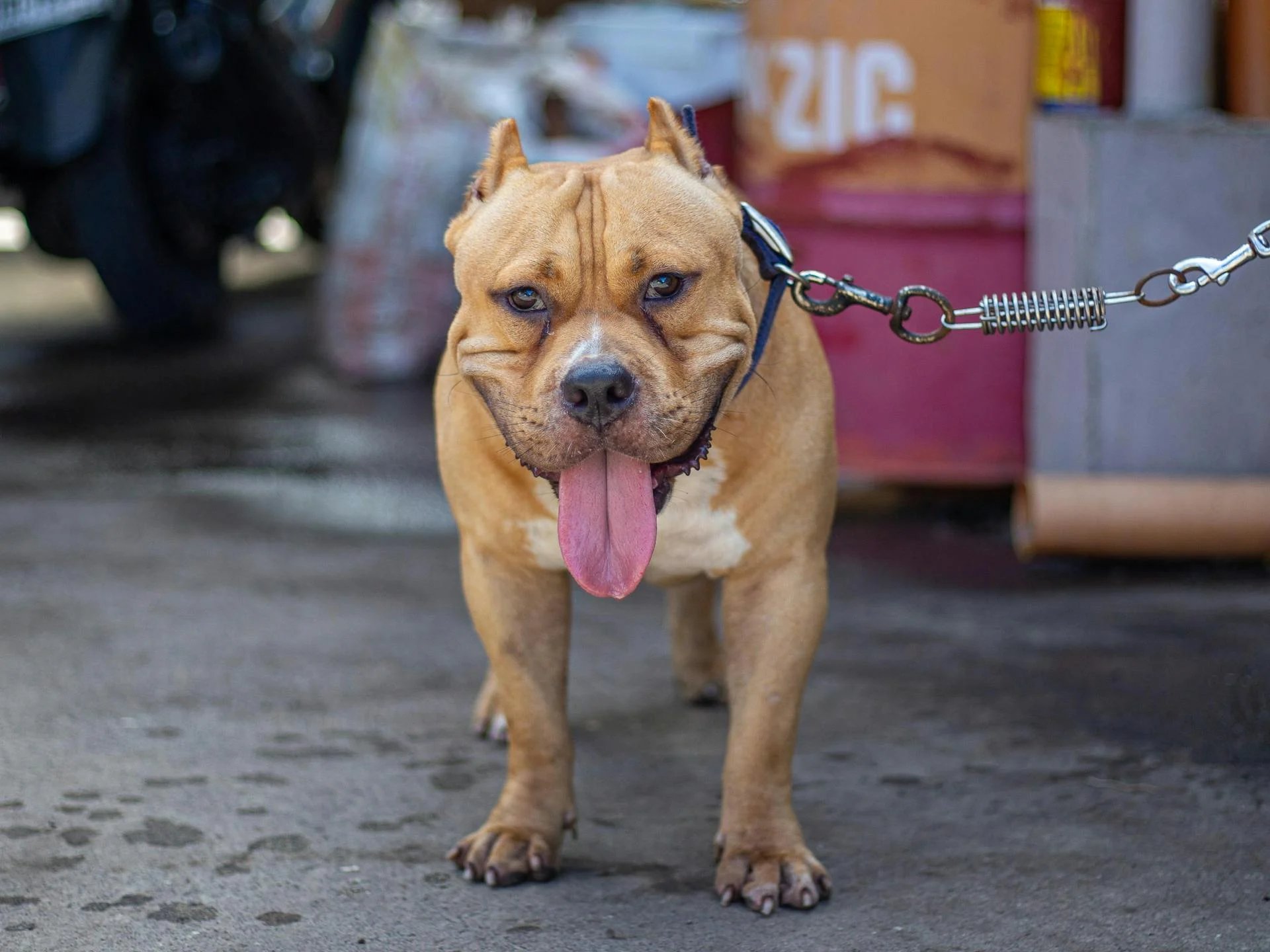
The American Bully is a breed that's often misunderstood, but it's actually a loving and loyal companion. They were originally bred from the American Pit Bull Terrier, a breed known for its friendly and outgoing personality.
One of the key characteristics of the American Bully is its muscular build, which is a result of selective breeding for strength and power. This breed is not for the faint of heart, as it requires regular exercise and a consistent training routine.
American Bullies are known for their short coats, which come in a variety of colors and patterns. They typically weigh between 70-120 pounds and stand between 17-20 inches tall at the shoulder.
For your interest: How to Breed an American Bully
Physical Characteristics
The American Bully is a breed that's known for its muscular build and Pitbull-like appearance. They come in three different sizes: pocket, standard, and giant.
The litter size of American Bullies is typically between 4 to 8 puppies. You can expect to pay anywhere from $2000 to $5000 for a puppy, depending on the breeder and the size of the dog.
A unique perspective: American Xl Bully Size
One thing to keep in mind when buying an American Bully is that some breeders may use steroids to enhance their dogs' muscular appearance. This is now illegal, but it's still a concern for potential owners.
The American Bully's appearance is similar to its Pitbull parent, with a muscular body and a large head. They have pointed ears, a square-shaped muzzle, and loose skin hanging down the sides of their face.
Here are the different sizes of the American Bully breed:
The standard American Bully type is a medium-sized dog with a compact, bulky muscular body and a heavy bone structure. Male dogs typically range from 17 to 20 inches in height, while females range from 16 to 19 inches.
Size and Variations
American bullies come in different sizes, with the XL type being a popular variation.
Males of this size range from 21 to 23 inches tall at the withers, which is the point between the animal's shoulder blades.
Females are slightly smaller, ranging from 19 to 22 inches tall.
The XL type is a significant size, and it's essential to consider this when choosing an American bully as a pet.
These dogs are built for size, and their adult height is a crucial factor in determining their overall size and structure.
Additional reading: American Bully Size and Weight
History and Origin
The American Bully breed originated in the United States between 1980 and 1990, making them a relatively new breed.
The breed's development was influenced by the American Pit Bull Terrier, American Staffordshire Terrier, and other Pitbulls, which were crossbred to create a dog with a lower prey drive and more of the "bully" traits.
The American Bully was first recognized by its breed club, the American Bully Kennel Club (ABKC), in 2004, which documented pedigrees and showed the breed against its written standard.
The breed has been developed to prioritize mass and heavy bone, resulting in dogs with a wide front, as desired by breeders.
If this caught your attention, see: American Bully American Staffordshire Terrier
History
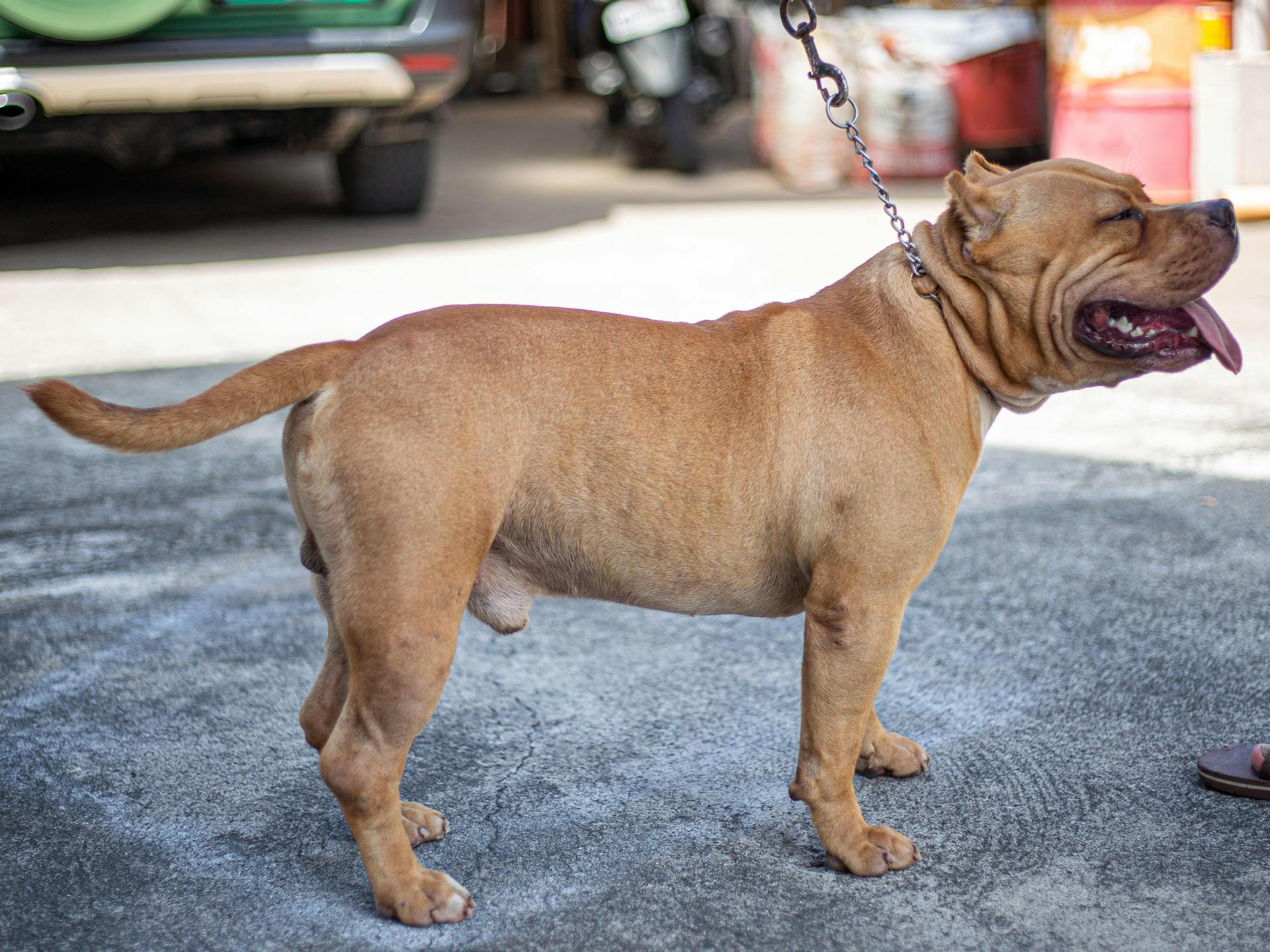
The American Bully breed has a fascinating history that dates back to the 1980s, with the majority of its development completed in the 1990s.
The breed's creation is closely tied to the growth of hip-hop culture, which is a notable aspect of its history.
The American Pit Bull Terrier was the foundation breed used to create the American Bully, with breeders crossbreeding it with other breeds to achieve the desired physical traits and size.
The APBT has maintained a characteristic appearance and temperament for over a century, with different strains emerging over time.
Breeders originally misrepresented some of these crossbred dogs as purebred APBTs, but eventually recognized them as a distinct breed.
The breed was further influenced by openly-acknowledged breeding with the American Bulldog, English Bulldog, and Olde English Bulldogge to fine-tune desired characteristics and personality traits.
The American Bully Kennel Club (ABKC) recognized the breed in 2004, initially as a means to document pedigrees and show the breed against its written standard.
The ABKC's primary goal was to produce a dog with a lower prey drive and more of the "bully" traits and characteristics than the American Staffordshire Terrier.
You might enjoy: English Bulldog vs American Bully
History of the
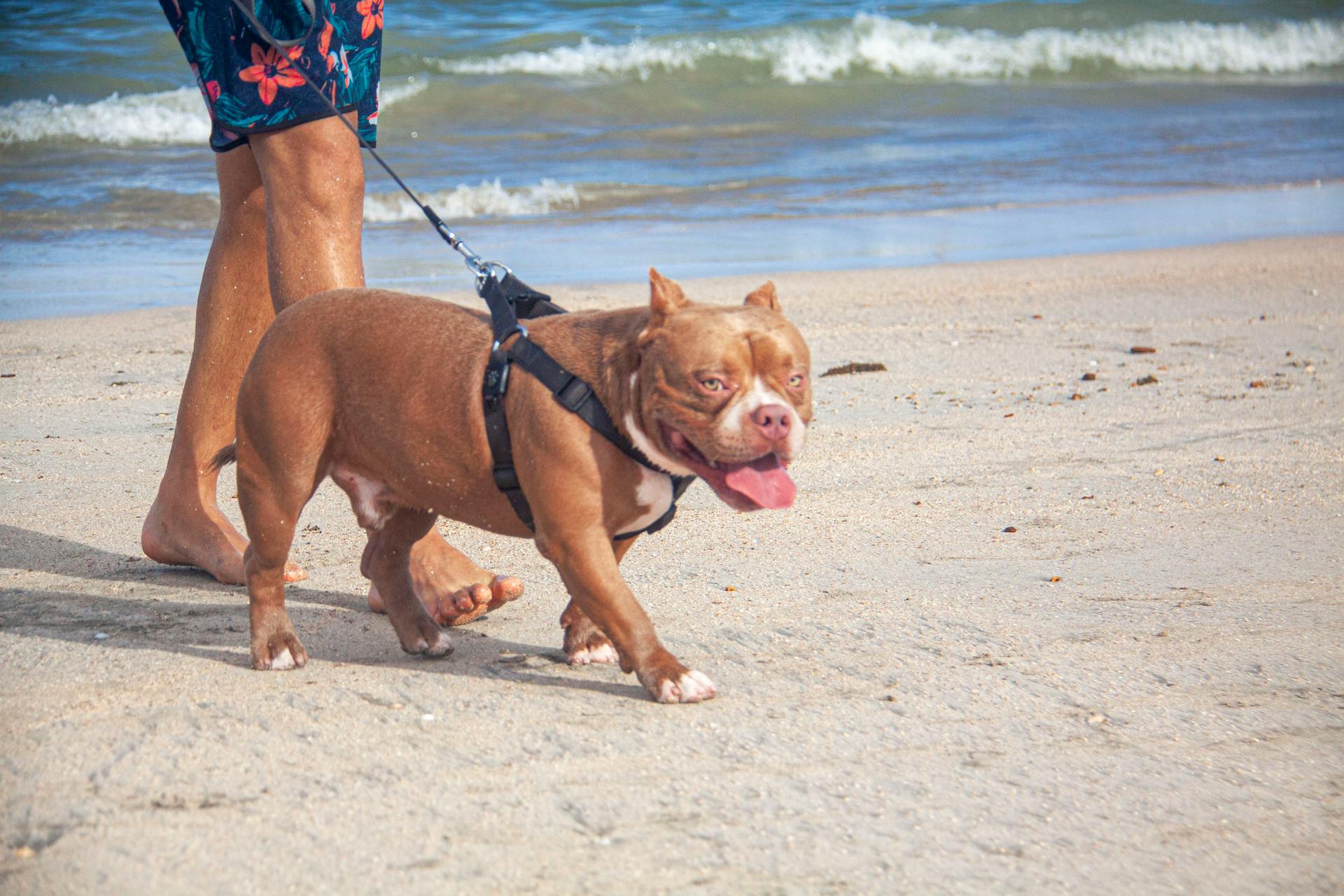
The American Bully breed has a fascinating history that dates back to the 1980s. The breed was developed from the American Pit Bull Terrier, with the goal of creating a dog with a lower prey drive and more "bully" traits.
The development of the American Bully was influenced by various breeds, including the American Bulldog, English Bulldog, and Olde English Bulldogge. This crossbreeding was done to fine-tune the desired physical characteristics and personality traits.
The breed was first recognized by the American Bully Kennel Club (ABKC) in 2004, which acted as a means to document pedigrees and show the breed against its written standard. The ABKC's initial desire for this breed was to produce a dog with a lower prey drive and more of the "bully" traits and characteristics than the American Staffordshire Terrier.
The American Bully's history begins around the 1980s with American pit bull terriers, the American Staffordshire terrier, and bulldog-type dogs. Breeders were selectively breeding soon-to-be American bullies, with a focus on eliminating aggression.
If this caught your attention, see: American Bully Dog Info
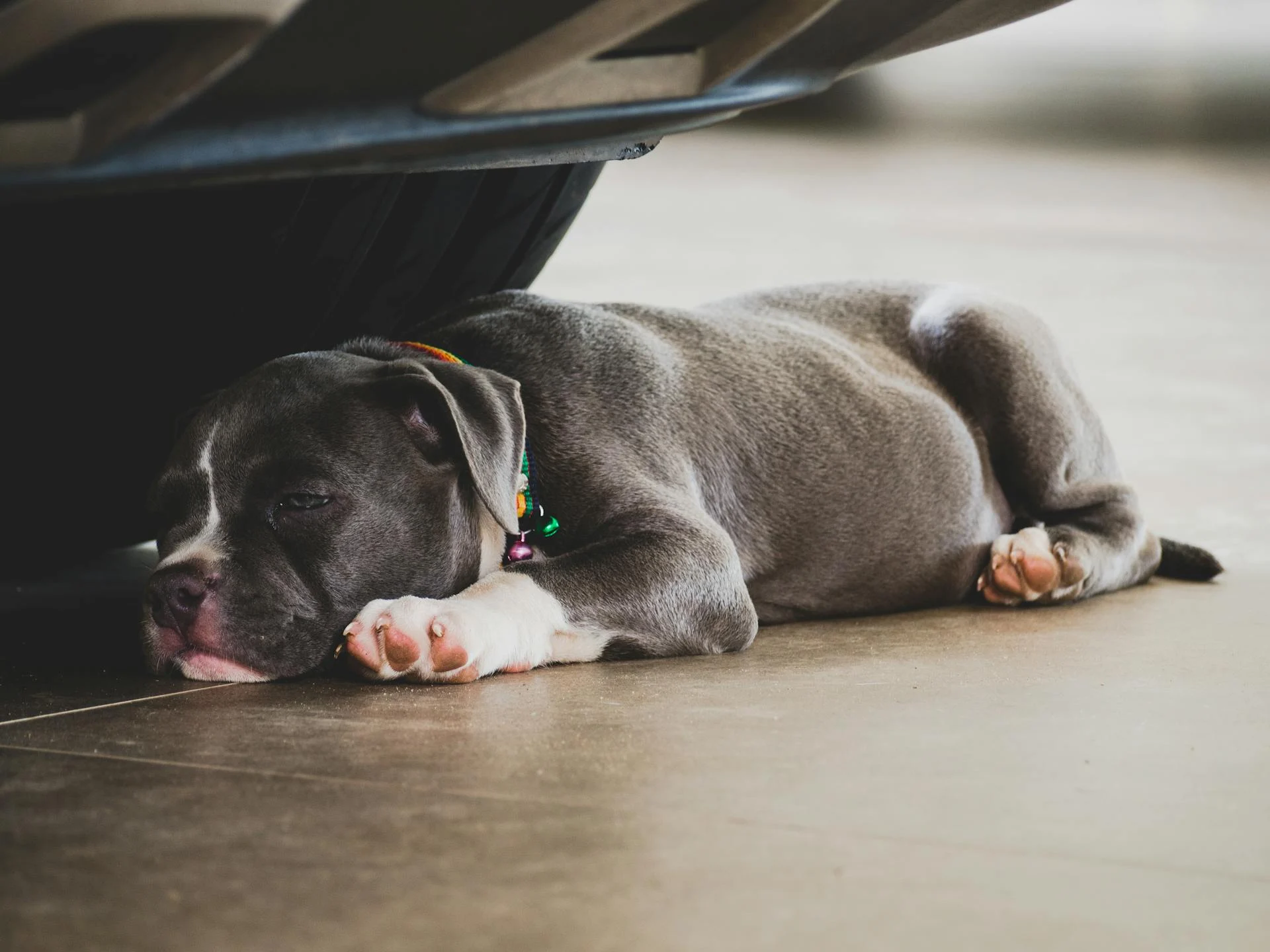
The breed's popularity grew in the 1990s, with the desired temperament and physical traits being established. This led to the formation of the American Bully Kennel Club in 2004, which set the breed standards.
The American Bully is often misunderstood due to its resemblance to the Pitbull breed. However, the two breeds are actually completely different, with the American Bully being bred for a soft and mellow personality.
The American Bully Kennel Club recognizes four sizes of the breed: pocket, classic, standard, and XL. These sizes are determined based on the dog's age, with all American bullies being classified as standard until they reach one year of age.
For more insights, see: Abkc American Bully Standard
Personality and Behavior
The American Bully is a sweet-natured and loving dog, bred to be a gentle companion. They make excellent family dogs due to their kind and affectionate nature.
These dogs love attention and will shower you with kisses and cuddles, making them perfect for families with young children. They thrive on human interaction and companionship, making them "people-oriented" dogs.
American Bullies are remarkably adaptable, suitable for various living environments, from bustling city apartments to spacious countryside homes. They adjust well as long as they are with their beloved family.
Their playful and energetic disposition makes them ideal playmates for kids, but supervision is necessary to ensure playtime is safe for everyone. Despite their muscular appearance, they are often described as "nanny dogs" due to their gentle and protective nature around children.
American Bullies are quick learners, excelling in obedience training and even agility courses. Positive reinforcement techniques work best, as they respond eagerly to praise and rewards.
These dogs are not inherently aggressive, and aggression is an undesirable trait in this breed. They engage in aggressive behavior only when feeling threatened or due to lack of socialization.
Suggestion: American Bully Aggressiv
Training and Socialization
Training an American Bully is a joy due to their high intelligence and eagerness to please. Consistency, patience, and positive reinforcement are key components to successful training.
See what others are reading: American Bully Training
Pocket bullies, a type of American Bully, learn new things fast and work hard to perform commands to get their owner's approval. They don't respond well to harsh corrections, so praise and rewards are essential.
Socializing your American Bully from a young age is crucial to develop a well-rounded temperament. Introducing them to various environments, people, and other animals at a young age helps them grow into confident and well-behaved adults.
Trainability
Pocket bullies are intelligent and want to please their owners, making them very easy to train.
They learn new things fast and work hard to perform commands to get their owner's approval.
Using harsh corrections is not recommended, as pocket bullies don't respond well to them.
Instead, use lots of praise and appropriate rewards like treats or playtime to encourage good behavior.
Training a pocket bully will be like a walk in the park, and basic obedience can be achieved in just a few weeks.
Related reading: Micro Pocket Bully Puppies
Consistency, patience, and positive reinforcement are key components to successful training for American Bullies.
Starting training early, from puppyhood, helps instill good behavior and social skills that last a lifetime.
Socialization is crucial for American Bullies to develop well-rounded temperaments.
Introducing them to various environments, people, and other animals at a young age helps them grow into confident and well-behaved adults.
Obedience training forms the foundation of a well-mannered American Bully.
Commands like sit, stay, come, and heel are essential for daily interactions and safety.
Given their strength, leash training is particularly important to prevent pulling and ensure enjoyable walks.
Socializing
Socializing is crucial for your American Bully's development, and it's great that they're naturally inclined to be friendly and outgoing. The American Bully is a very sociable dog who loves people and wants to be everybody’s best friend.
Socialization should start early, ideally from a young age, so your dog learns to be confident in new situations. To help your American Bully feel more at ease, you should introduce them to new places.
New sights, sounds, and smells can be overwhelming for a puppy, so it's essential to expose them to these experiences gradually. This will help your dog learn not to be scared.
Introducing your American Bully to new people and animals is also vital for their socialization. You should introduce them to people and animals in a controlled environment to prevent any potential conflicts.
Grooming
The American Bully's short, smooth coat is a blessing when it comes to grooming. You'll only need to brush them once a week, which is a breeze.
Their coat doesn't shed much, so you won't have to worry about hair all over the house. You should also only bathe them once a month.
Brushing their teeth is crucial, and it's best to do it every day if you can manage it. Giving them dental sticks to chew on can make this task easier.
Nail clipping can be a bit painful if not done properly, so it's best to have your vet or groomer do it for you.
Family and Lifestyle
The American Bully is a loving and caring breed that makes an excellent family companion. They're particularly gentle around babies and sweet with children, making them the perfect playmate.
They're happy to curl up next to you on the couch and love to show affection with lots of licks and kisses. Their loyalty is one of the reasons they make such good family pets.
The American Bully doesn't require huge exercise, but they do need a place to go out and play. They can thrive in apartments and smaller homes as long as they have a yard to run around in.
Intriguing read: American Bully Family Dog
Daily Life
Living with an American Bully is a unique experience. Their diet is a crucial aspect of their daily life, and they require a high-quality dog food that is rich in protein and calories to maintain their muscle mass.
They need to eat at least 2-3 cups of food per day, divided into 2-3 meals. This is because they have a large appetite and need a lot of fuel to keep their energy levels up.
Expand your knowledge: American Bully Food Allergies
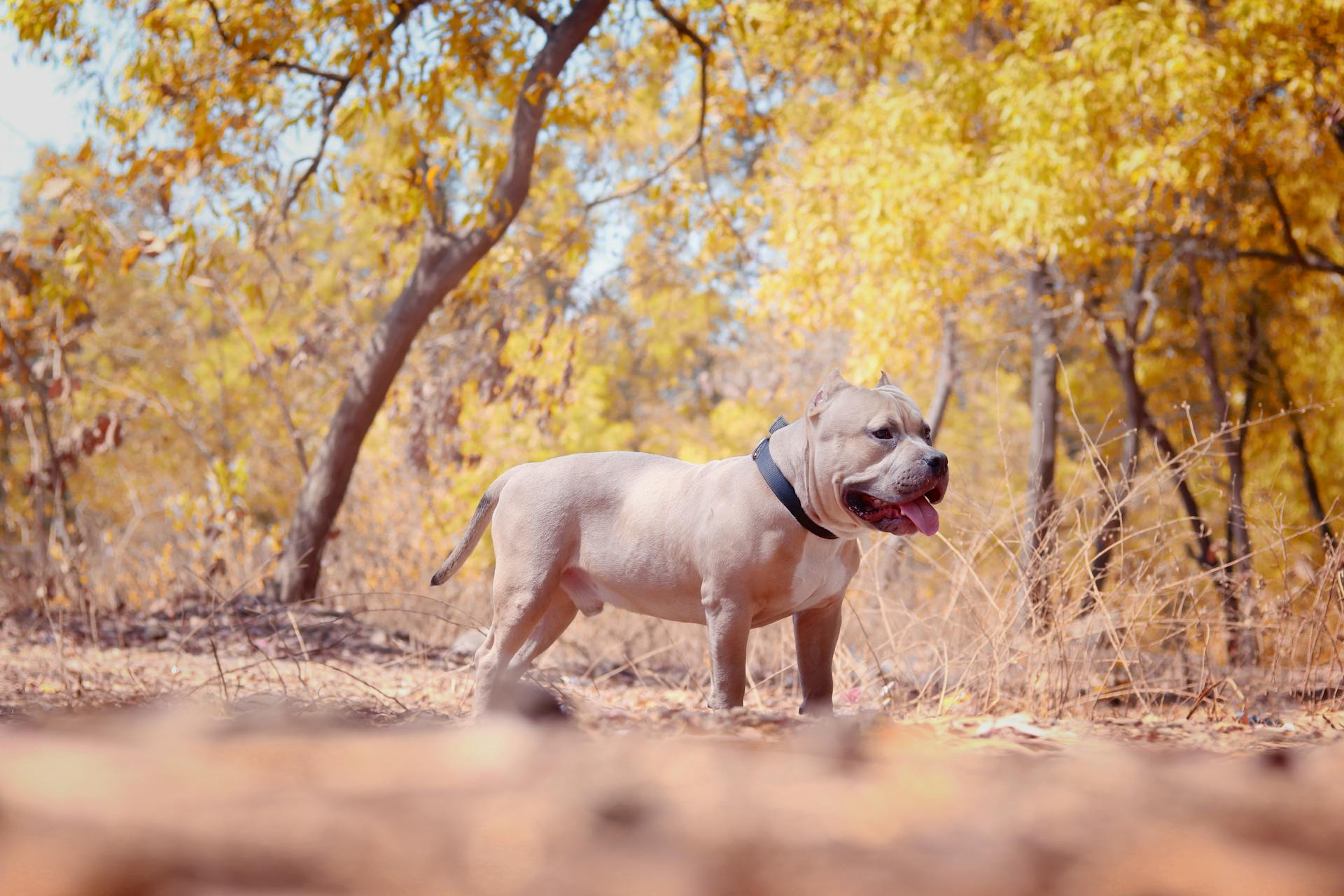
Exercise is another essential part of an American Bully's daily routine. They require regular physical activity to stay healthy and happy.
A daily walk of at least 30 minutes is recommended, but they also need playtime and mental stimulation to prevent boredom and destructive behavior. This can include activities like playing fetch or going for a run.
Grooming is also an important aspect of an American Bully's daily life. They have a short, smooth coat that requires regular brushing to remove loose hair and distribute skin oils.
A weekly brushing session is recommended to keep their coat in good condition. They also need regular nail trimming, ear cleaning, and dental care to stay healthy and clean.
Family Compatibility
The American Bully breed is a loving and caring companion that makes an excellent family pet. They're particularly gentle around babies, so you won't need to worry about introducing them to the littlest member of the family!
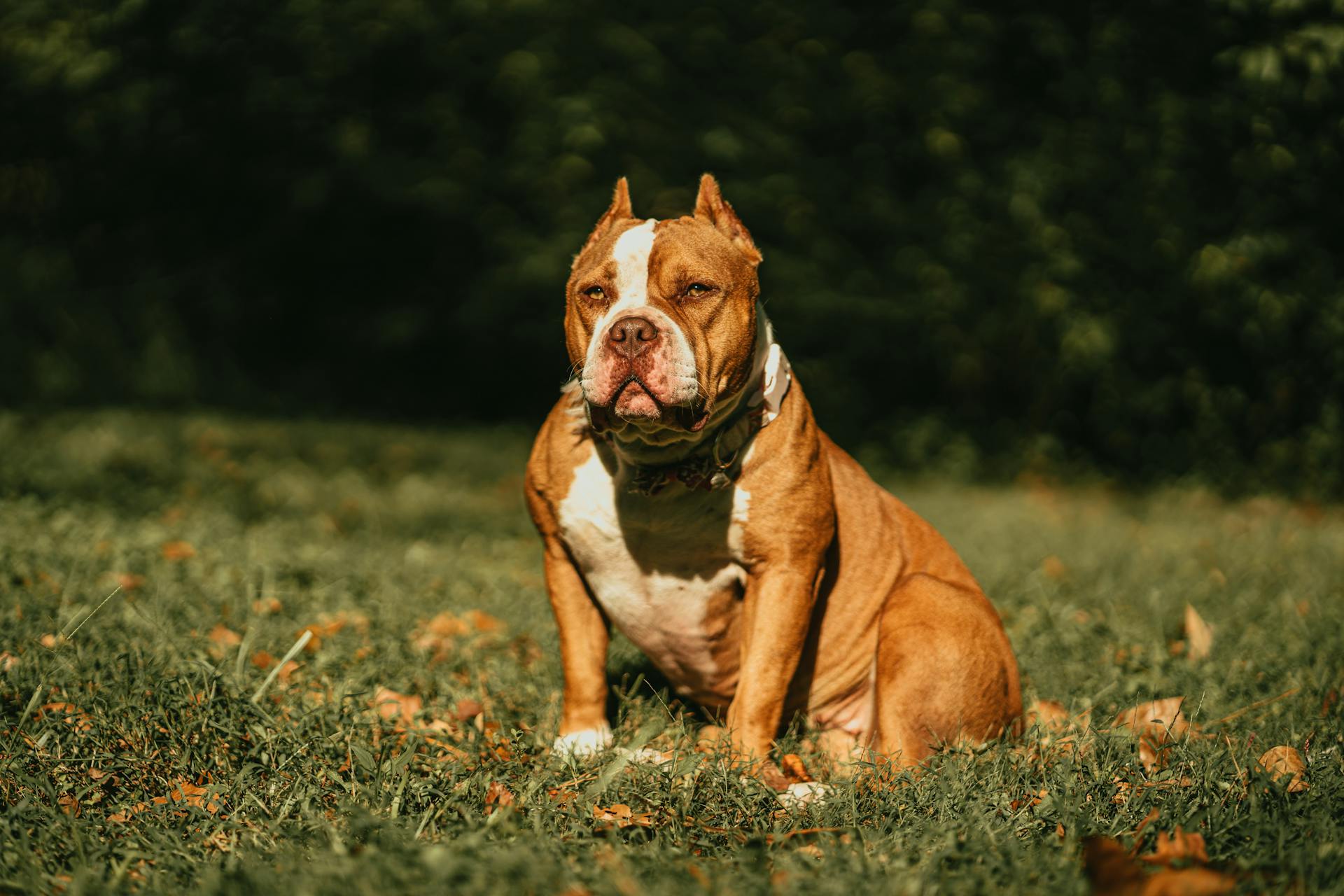
They're sweet with children and love to play with them, making the perfect playmate. They're also very loyal, which is one of the reasons they make such good family pets.
The American Bully is happy curling up next to you on the couch and watching TV, and they love to show you how much they love you with lots of licks and kisses. They don't have huge exercise requirements, but they do need a place to go out and play.
They can live happily in apartments and smaller homes, as long as they have a place to go out and play. A well-socialized pocket bully will get along well with children of all ages while keeping kids in the family active.
Frequently Asked Questions
What breeds make up American Bully?
The American Bully breed is a mix of several influential breeds, including the American Pit Bull Terrier, American Bulldog, English Bulldog, and Olde English Bulldogge. These breeds combine to create a unique and distinctive dog.
Is an American Bully a pitbull?
American Bullies share ancestry with Pitbulls, but they are a distinct breed developed in the 1990s. While related, American Bullies have their own unique characteristics and history.
What is the genetic makeup of the American Bully?
The American Bully is genetically a Pitbull sub-breed, sharing a common ancestry with Pitbulls. Its pedigree analysis reveals a strong Pitbull influence, making it essentially a Pitbull variant.
Featured Images: pexels.com
